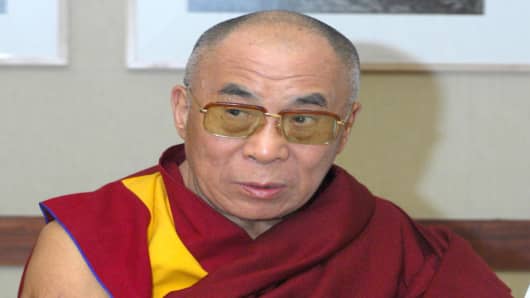A mob wielding stones and knives killed a Chinese policeman in a Tibetan part of western China, state media said on Tuesday, in a sign that unrest continues despite a massive influx of police and troops.
Wang Guochuan died in an attack on Monday on a group of police in the Ganzi (Garze) Tibetan Prefecture in Sichuan province, Xinhua news agency said, adding several other officers were wounded in the clash that ended when police opened fire.
"The police were forced to fire warning shots, and dispersed the lawless mobsters," the brief English-language report said.
The latest news of unrest comes after protesters seeking to put pressure on China tried to disrupt the Beijing Olympic torch lighting ceremony in Greece. Xinhua did not say if the attackers were Tibetan or whether any protesters were hurt or killed.
But in a separate report overnight, the Tibetan Center for Human Rights and Democracy, an exiled group, said "at least one Tibetan protester was shot dead and another left in critical condition" after People's Armed Police fired on a demonstration in Ganzi Prefecture on Monday.
Some 200 protesters, including Buddhist monks and nuns, marched on the local township government chanting slogans for the Dalai Lama, their exiled spiritual leader, and for an independent Tibet, the group said.
The protester shot dead was an 18-year-old monk, it said.
Foreign journalists have been prevented by officials from freely going to the area and Reuters could not independently verify the reports.
Mountainous, heavily Tibetan parts of western China have seen a wave of sometimes violent anti-government demonstrations since last week, following a March 14 riot in Tibet's capital Lhasa.
Xinhua had said the areas had been calm since late last week, when China has poured paramilitary police and troops in to prevent further unrest, which the government says has been coordinated by the Dalai Lama from his home in exile in India -- an accusation he has repeatedly denied.
Stricter Control Of Monasteries
China's Minister for Public Security, Meng Jianzhu, and a team of other central officials have also visited Lhasa, vowing stricter management of Tibetan Buddhist monasteries there, the official Tibet Daily reported on Tuesday.
"Tibetan Buddhist culture is an important constituent part of Chinese civilisation," Meng said, according to the paper. "But any religion must act within the bounds of the constitution and the law, and not interfere in administration, the judiciary, education and so on."


